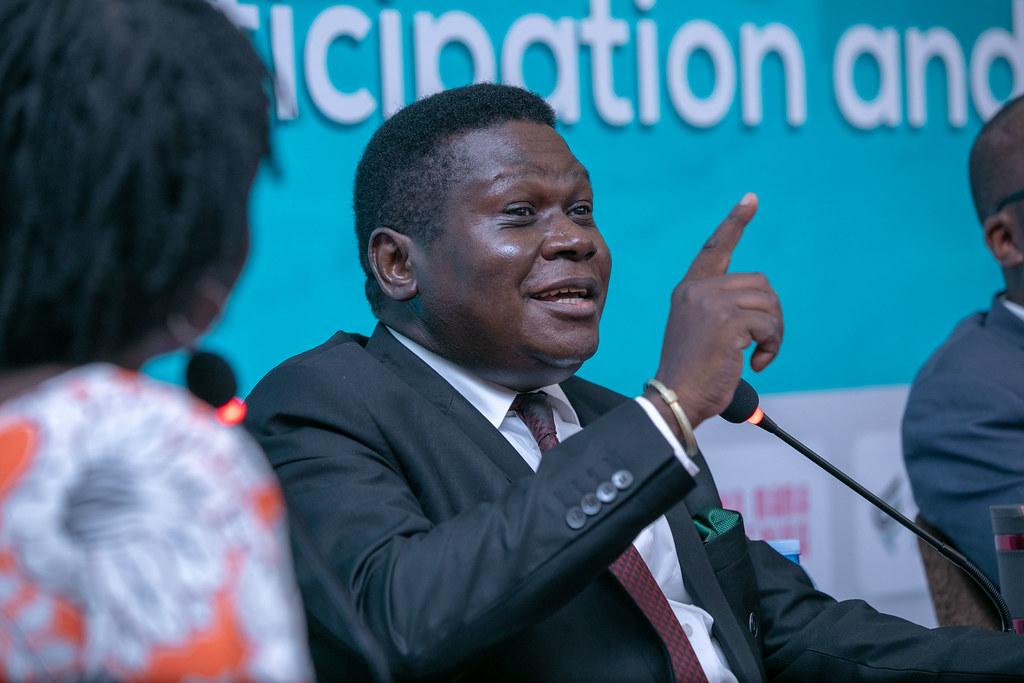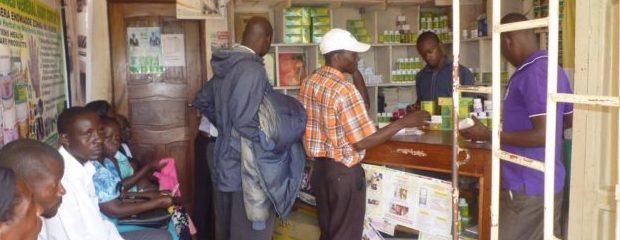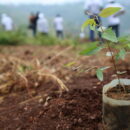Uganda: Is co-opting the opposition shrewd politics or a desperate ploy?

Uganda’s oldest opposition party is now allied to President Museveni’s NRM.

Norbert Mao, the leader of the Democratic Party (DP) , is now Uganda’s Justice Minister. Credit: Chapter Four Uganda.
Last month, one of the longest standing features of Uganda’s political landscape crumbled as President Yoweri Museveni signed an historic “cooperation agreement” with the country’s oldest opposition party. The pact between the ruling National Resistance Movement (NRM) and the Democratic Party (DP) is purportedly aimed at ensuring collaboration on matters of constitutional importance. Norbert Mao, the leader of the DP, was immediately appointed as Minister of Justice and Constitutional Affairs.
This development is the latest example of Museveni’s long-established pattern of co-opting opposition figures into government. Many pundits have responded to it by speaking of the 77-year-old president’s exceptional shrewdness and capacity to outmanoeuvre his opponents.
However, this perspective overstates Museveni’s political tact while ignoring the volatile context driving him to take these measures. The president’s co-option of political rivals is arguably more a reaction to growing opposition than an element of considered strategy. Moreover, while the tactic may be effective in the short-term, the way it rewards critics may fuel more opposition in the medium-term.
Picking off the DP
Museveni’s strategy of co-option relies on identifying frustrated opposition leaders whose careers face some sort of crisis and who are eager to rekindle their political fortunes. The DP and Mao, its president since 2010, perfectly fit the bill.
First founded in 1954, the DP has seen its political prospects steadily diminish since the early-2000s. In 2001, Kizza Besigye became the face of the opposition in Uganda. And in 2005, his establishment of the Forum for Democratic Change (FDC) saw huge numbers of seasoned politicians from DP and other parties defect to Besigye’s platform. The FDC became the country’s leading opposition party, leaving a bitter taste in the mouths of DP stalwarts who had hoped to become key opposition players following the restoration of multi-partyism in 2005.
In subsequent elections in 2006, 2011 and 2016, the DP trailed far behind the FDC. It won only a handful of parliamentary seats and recorded a high of 1.86% in the presidential vote as Besigye averaged 33%.
The emergence of Bobi Wine as a political force in 2017 and the establishment of his National Unity Platform (NUP) in 2019 triggered an even larger exodus from the DP. 11 of the party’s then 13 legislators, coupled with significant numbers of grassroots activists and leaders, crossed over to Bobi Wine’s camp. The DP, which had already suffered endless internal disputes over ethnicity, leadership, and finances, was left in disarray.
Since then, Mao’s disgruntlement has become more overt. He has publicly attacked the NUP and FDC as well as “rebels” and “saboteurs” within the DP itself. Mao’s critics have responded in kind, accusing him of working covertly with Museveni to undermine the opposition – accusations they claim have now been vindicated.
The NRM’s offer
Museveni clearly recognised that Mao – frustrated by a waning career, internal factionalism, and displacement by more popular opposition rivals – was a prime candidate for co-option. But bringing former rivals into government is about more than just identifying potential defectors. It is also a deeply monetised affair, as all Ugandan politics has become under Museveni.
The recruitment of an opposition politician is usually accompanied by some under-the-table payments, whether in the short- or long-term. The details of these shadowy deals are, as one would expect, difficult to verify, but talk of who could have received Museveni’s “envelope” or could be on his “payroll” are common in opposition circles.
Co-option is also always followed by an appointment to a “fat” government job. As well as Mao’s appointment as justice minister, the DP-NRM deal will see DP candidates supported to join the East African Legislative Assembly as well as head up various parliamentary committees, statutory bodies, departments, and government agencies.
These positions bring plenty of potential reward. Ugandan politicians are among the most highly paid on the continent. Furthermore, they stand to benefit from a range of financial deals outside their official salaries and emoluments. In 2005 and 2017, for example, legislators were each paid USh5 million ($1,300) and USh29 million ($7,400), respectively, to amend the constitution to remove clauses that would have prevented Museveni from continuing in office. These payments were labelled as allowances intended to facilitate “consultation”.
This range of benefits is intended to compensate for the significant difficulties opposition figures take on by joining the ruling party. Crossing over to the NRM often means openly contradicting the principles one has always claimed to stand for, betraying colleagues with whom one has worked for years, and facing ruthless criticism from the public – as well as taking on the all-too-common risk of being dumped by Museveni once the defector has served their purpose.
The NRM’s guaranteed access to state resources, however, means it is always in a position to meet any demands the target may put forth. Additionally, its pervasive control of the state apparatus also allows it to shield the recruit from many negative consequences of defecting – for instance by providing security, preventing corruption investigations, and platforming the recruit on media outlets to justify the crossover and sanitise their image.
Does co-option work?
While the NRM is skilled at co-opting opposition figures, it is questionable as to whether its use of this strategy reflects strength and is ultimately effective.
For instance, while the tactic tends to trigger suspicion and friction in opposition ranks, it may also incentivise wily politicians to become more critical of the government in order to attract attention and be offered a similar deal. This counterproductivity could explain why Museveni has always needed to co-opt more and more opposition political figures over the years.
The strategy may also embolden the opposition. While defectors may enjoy various financial benefits, they are also typically tasked with doing the NRM’s dirty work. Mao, for instance, will likely become the face of further proposed constitutional amendments that would entrench Museveni’s rule or ease his son Muhoozi Kainerugaba’s ascendance to power. In the months preceding the pact, the DP leader authored op-eds that spoke positively of Muhoozi who, in turn, called Mao the “most brilliant opposition leader”. The NRM likely hopes the new justice minister will act as a shock-absorber, diverting public criticism from the regime and preventing anti-Museveni sentiments from crystallising. To the public and many in the opposition, however, Mao’s departure is both evidence that he was a secret NRM agent all along and a reason to stop infighting and develop greater clarity of vision.
Whether or not co-option is ultimately effective, its use appears to reflect the NRM’s growing crisis of legitimacy. While the strategy goes back to the late-1980s, those recruits were selected based on their expertise and as part of national reconciliation efforts after decades of conflict. Today, the NRM co-opts opponents less because of national interests or the defectors’ competencies, and more because of their symbolic value – the image of invincibility they project on the NRM.
However, the need to communicate this message today has become so important precisely because of the NRM’s declining popularity. So long as it fails to address the political repression and economic mismanagement driving this crisis, it is questionable if bringing the man who came fifth in the 2021 presidential election with 0.56% into the fold will turn this tide.







hello